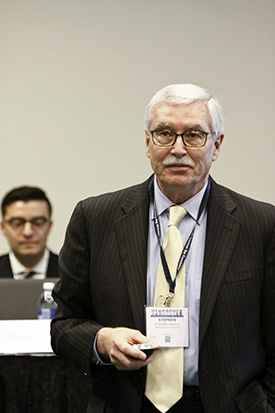Would an overhaul of federal student-loan programs help bring down law school tuition?

Barry Currier, the ABA’s managing director of accreditation and legal education. Photos by the Canadian Press Images/Michael Desjardins.
Could reforming the federal student-loan program be a way to halt the skyrocketing cost of attending law school? At the 2018 ABA Midyear Meeting in Vancouver, British Columbia, the American Bar Foundation gathered a panel together to discuss the issue in “The Perennial (and Stubborn) Challenge of Cost, Affordability and Access in Legal Education: Has it Finally Hit the Fan?”
“If I have to put the blame for the title of this panel on any one place, I would put it on these student loan programs and the fact that they are basically unregulated, really, in terms of the amount,” said Barry Currier, the ABA’s managing director of accreditation and legal education.
“The students can borrow as much money through those programs as they want,” Currier said. “So if Harvard Law School or New England Law School said, ‘Tuition at our school next year is $200,000, and living expenses are $50,000,’ the federal government wouldn’t say, ‘You’ve got to be kidding me!’ They would say, ‘Where can we send that check for $250,000?’ ”
Currier made sure to mention he was not speaking for the council of the Section of Legal Education and Admissions to the Bar. “I’m here on my own behalf.” And he also issued the caveat that the jury was still out on whether tuition increases were conclusively driven by the federal student-loan programs. “But I think if you had to pick one place, that’d be where I would go.”

Stephen Daniels, a senior research professor at the American Bar Foundation.
Currier and Stephen Daniels, a senior research professor at the American Bar Foundation, both drew attention to a current bill that would impact the federal student-loan program and potentially cause havoc for law schools and law students. HR 4508, the Promoting Real Opportunity, Success and Prosperity through Education Reform Act was introduced in the House of Representatives in December.
“That bill, as currently written, eliminates the loan forgiveness programs that are now in effect, and it puts a cap on student borrowing for graduate and professional education of $28,500 a year,” Currier said. “And I venture to say that if a cap of $28,500 per year were put on law school borrowing through the federal student-loan programs, one of two things would happen: A lot of students would then not go to law school because they couldn’t afford it. Or the interest rate they would have to borrow on the private loan that they would have to take out to supplement that would be at a rate of interest that would make it really difficult to justify the decision to go to law school.”
Even if passed by the House, it’s unclear how the Senate would respond to the PROSPER Act, Currier said. “So whether there will be a cap, and if there is a cap, what the cap will be, is at this point unknown. But for law schools at this point in time, this is a very serious issue.”
When asked by an audience member how he would approach reforming the federal student-loan programs, Currier had four suggestions, some of which he admitted were “pie in the sky.”
• The federal government could decide to reduce the profit margin it takes on student loans, recognizing law school and legal studies as a public good.
• States could reinvest in legal education as a way to increase access to justice.
• Law schools could be allowed to limit the amount their students could take out in loans.
• Risk could be shared between the federal government and law schools, so that if a student defaulted on their loan, the federal government would recoup some of the money from the school.
“Let the schools have a little bit of skin in the game,” Currier said of this last suggestion. “That might trim the school’s appetite for taking students that they aren’t sure can graduate and pass the bar and get a good job.”
A video of Saturday’s full panel discussion.
Related article:
ABAJournal.com: “House bill to reportedly call for federal student loan caps, end of Public Service Loan Forgiveness”
Follow along with our full coverage of the 2018 ABA Midyear Meeting



